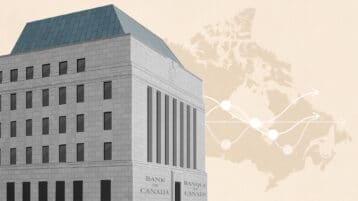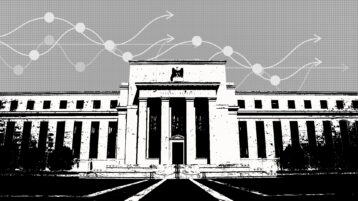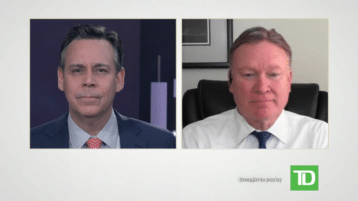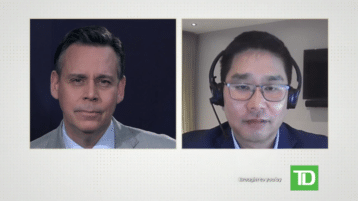Print Transcript
(energizing music) Hello. I'm Greg Bonnell. Welcome to MoneyTalk Live brought to you by TD Bank investing. It's a new program broadcast daily on web broker. I'll be joined by guests today and we will take you through what is moving the markets and will take your questions about investing. Coming up on today's show. We will talk with slowing growth in the high prices and what that means to the economy with Alexandra Gorewicz. And in the education segment, Nugwa Haruna will speak with us as well. To email us a question please email to MoneyTalk live. The TSX now in negative territory to the tune of 1 1/4%. You're seeing some pressure from the energy and mining stock today. We have West Texas sitting at levels for a while, $105 a barrel for crude and that is significantly different from last week, hundred $22 a barrel. We are seeing some strength and some of the Teck on both sides. It's jumped about 7%. It looks good in a one year basis but the actual stocks are leading to the upside on Bay Street at this hour. Let's give that broader REIT of the American market, the S&P 500, positive territory, up six points. About 16 basis points to the upside. We are still listening from Jerome Powell. Not really changing his tune. Talking about what the feds need to wrestle down inflation. If you want to really dig, that's what we do as investors, we do through his commentary of officials. They are not trying to trigger a recession but Jerome Powell could not roll one out as they try to wrestle inflation down. Let's check the tech heavy NASDAQ and how it's bearing at this hour. A bit stronger than the broader market. You can see the NASDAQ 100 up almost a full percent. KB home on the radar today expecting an average selling price for new homes in the United States to continue increasing this year. It's getting a bit of a bid right now up almost 9 1/2%. Let's take a look at the US dollar. It's been a big part of the investing story this year. Right now you were down modestly as the international currencies measured by the DX why US dollar currency Index. Down about 1/4 of a percent. And that's her market update. (energizing music) You may see the term stagflation floating around. What does that actually mean for the economy in the portfolio? Here to discuss our guest of the day, Alex Gorewicz! great tabular program. >> Thank you great to be here. >> The term stagflation keeps cropping up every once in a while. What does that mean in a period of low growth and high prices? When we need to think about as investors? >> I think stagflation gets thrown around a lot without people actually thinking of the real definition which would be no growth or potentially a recession. But recession being high or prices continuing to rise in fact. There is the third component which is unemployment. Unemployment in stagflation tends to increase despite inflation being high because of the growth aspect. Now, we've been hearing this word thrown around over the past year or so. Despite labour markets being very strong and unemployment continuing to fall. In part, it's been not because of growth being negative or necessarily falling but because expectations about growth have been revised lower and expectations around inflation and then obviously realized inflation moving higher. So, the trend on all these three different metrics has been towards stagflation without actually idle necessity of that term in a sort of definitional sense. >> As a kind of scary scenario that people don't want to find themselves in, what does an investor do? If you end up in an environment like that? Has it been 40 years like this? >> The last known stagflation. Was in the 90s. It's very easy to draw comparisons to that point in time from an investing perspective because both stocks and bonds have generated very negative returns this year. But, we also appreciate the differences both economically as well as financially from today compared to the 1970s. So the 1970s, our economy was geared a lot more towards manufacturing. So when we had the end of the oil shocks and we had a series of price pressures building during that time, the impact to the real economy was significantly greater than it could be today from, again, an output perspective. We also from the financial sense, we also had, you know, a market that was less, I guess, developed in some sense and we see it today. So for example high-yield bonds didn't really exist or if they did, they were much more niche. That segment of the market was much more niche. Derivative, hedging instruments, all kinds of financial assets that we use today to express your views did not exist at that time. Why that's important and, one other thing, this is a big one too if you look purely in stocks, compositional differences at the time. In the 1970s you would've had a lot more stocks that represented again the real economy. Very manufacturing based. Where is today, even a broad-based index like S&P is more geared towards growth stocks. So when we think about all the different you know, elements that make up our economy today and make up our financial markets today, we can't just draw some conclusions that "oh, if this happened in the 1970s then it must happened again today." So it just necessitates being a little bit more nimble and a little bit more thoughtful about how you invest portfolios. >> Good perspectives to know that. Just because it happened once doesn't mean it could happen the same way again or at all. Let's talk a bit more about the job market because the headlines of all been recently saying that if there is an advantage to the worker, the labour market is tight, workers can call the shots. But now you are getting corporations saying "we fear recession, we further perhaps that will mean going back on our workforce." Where does the truth lie in here? >> There's no doubt that the labour market is very strong. We have seen across multiple sectors high turnover rate? People changing jobs and finding other opportunities. Higher pay perhaps. And they are taking advantage of those. When we look, at job vacancies, we see there at record high. So, again, this creates this notion that employees have a lot of power here. Labour has a lot of power in the market. So all of this feeds this perception that a job market is very strong and that it could persist. But, it's important to note that even before the pandemic, there were record job openings. When you take that into perspective, this idea that "okay, we're headed towards very fast tightening monetary policies and that should have only a marginal impact on the labour market." It's not necessarily the case. Because this notion of high job vacancies existed largely because of his skills mismatch between what corporations were looking for or what employers are looking for versus the skill set that existed. And how much of that goes away as this spare capacity and leave the labour market today versus existing employees being laid off, is a big question mark. If you look at the job market today we feel more companies are feeling the price pressures and it doesn't take very much for unemployment to start ticking higher across multiple sectors. Not just the ones where we know the price pressures have been most acute. >> Another big question, so many big questions… >> We had the fear that inflation is not rolling over. The peak is not behind us and so markets went ahead and started pricing a lot more interest rate hikes. Interest rates rose Kallestad rolled over and and the Fed delivered 75 basis points. A great hike. Then we had a reminder from here at home with yesterday's CPI print in Canada that inflation is making new highs. Which, by the way, Bank of Canada had warned us about and it is actually happening. And so when we look at the inflation side, there are real concerns for the market and you can't just, you know, put it behind us. But then there is the growth element. So we start looking at PMI's now. Leading indicators. These are aspects that tend to you know, lead recessions or at least a significant growth slowdown. We had some pretty big miss is on PMI's today out of Europe and out of the US. What does that mean for growth? That's generating a bit of a risk off. Not so much a risk off but you talked at the start of the show has stocks are doing. They're not doing too poorly. NASDAQ in particular is up-to-date because rates are falling. Why are real rates falling? Because the market is saying today that inflation is still a problem but growth might become a bigger problem much faster than we were expecting. So it really depends from one data to the next. You can have the narrative change very quickly and then the market would whip around on you. > Great start of the program. When you get your questions for Alex Gorwicz. Portfolio Management with TD asset management. And now an update on how some of the markets are trading. Unionized workers and to Bombardier… Followed by 3%. A one-day strike last week. Wages soar in the face of… United Airlines cancelling 50 daily flights in the United States and the bid to reduce airport delays which are playing gang travellers. They say the move affects only domestic flights in New Jersey. United Airlines says the schedule reduction is not due to staff shortages or rather capacity constraints at the airport. Travellers have been facing delays and long lineups and airports across North America as the industry works to accommodate this increased demand we are seeing following the worst of the pandemic. Warren Buffett's Berkshire, boosting in the company's shares. Following some 7 billion in purchases of Occidental Petroleum. A quick check in on how the benchmark are trading. We will start right now on Bay Street. 275 point deficit for the TSX composition index. We are seeing pressure in some of the heavier sectors including energy. Materials as well. And south of the border, interesting to keep an eye the S&P 500. It is flipping back and forth on the side of the breakeven line right now. Modestly in negative territory. Investors try to field their way through this market down about three points at this hour. A lot of viewer questions coming in for Alex. Let's get to the right now. The US dollar strength has been such a big market story. A viewer wants to know if we can expect to continue? >> Certainly it is possible. The US dollar in addition to perhaps one or two other major currencies like the Japanese yen, they are typically risk off currencies. So in an environment where we are now all worried about recession, the US dollar tends to do well in that environment. The Japanese yen tends to do well in that environment. Then procyclical currencies or perhaps even commodity related currencies like the Canadian dollar tend to face more head wounds. If we are going into a recession, or at least a significant growth slowdown in commodities do rollover. Canadian dollar probably doesn't appreciate relative to the US dollar. So this strength is at least on the US dollar front is mostly emanating from the growth of risk. To the extent that that persists it should mean a stronger US dollar. > What is the risk here for the US currency? People think it gets stronger from here but what can derail that strength? >> Certainly a change in the risk sentiment which could happen if inflation rolls over. So, one of the major drivers right now is obviously inflation peeking. If it's not, how much more rate hikes do we have to assume that central banks in this case the Fed will deliver to fight that inflation? If the answer is a lot more, you know, it proves to be ineffective, that could have an impact on risk sentiment. But if we assume that they are going to be effective order of commodities rollover and more persistent ways, and inflation expectations go down with them, it could generate a risk on a rally in which case the US dollar could in fact weaken. >> More questions coming in from the platform this morning. This would not be on the minds of a lot of people: the market looks like it is starting to price in fewer interest rates hikes will this be done when September rolls around? > I think part of the euphoria at the moment is that we've seen now a couple of weeks of just broad commodity basket index coming down. If there is room for that to run? That could take away some of the pressure we've seen on inflation. If we look at inflation, core inflation, anything that excludes food and energy costs, appears to be stalling. At the very least it's not continuing. It's upward climb at the same pace. I'm mostly saying this about the US. But headline inflation, which includes food, includes energy, continues to move higher. If we look at certain segments of the fixed income market, they are actually suggesting that the peak of inflation is in a couple of months. It could be August, it could be September. No I don't think investors having priced out these hikes which is a relatively new development over the past week, I don't think investors appreciate that risk because it does materialized. In other words if inflation actually was higher, headline inflation, how is the Fed going to respond? They're going to respond by being even more aggressive. It could be a little bit premature to start pricing out rate hikes. > Great perspective on that one. Another viewer question. Within the fixed income space what is your view on corporate versus government bonds right now? >> So if we are headed for a recession, let's look at how risk assets have brought the performance. By risk assets we can take stocks, corporate bonds. Typically anything that is not as sovereign of an instrument is considered a risk asset. Stocks have corrected a lot. We are seeing more than 20% down year to date. Officially that bear market. If you were to use that as a precursor to a recession, they actually priced in quite a bit about recession risk. Have credits done the same? I would say the answer is no. That is true both for higher-quality investments corporate bonds as well as high-yield corporate bonds. What is my point? If we are headed for a recession and if it happens to come about much sooner than expected, I think corporate spreads need to continue to wanted. However, thinking through you know, the previous question… It looks tight like the market is priced out… By doing that what is happened is the risk-free rate of government interest rates have actually fallen. That creates an offset. So even if credit spreads widen, you have government interest rates falling and actually, what you see is your total yields are not really changing. So in some ways, while taking the cycle if you edit assuming that a recession is coming, it would suggest a natural press conference for government bonds over corporate bonds. Overall yields are very attractive at these levels and we would suggest that you will do well with either one. Just because we now have income again. Fixed income. >> Those corporate's versus government. We have another question that wants to talk about the high-yield space right now. What you would be thinking on that front? >> So when we think about historical relationships, high-yield versus investment rate, high-yield versus stocks… What we see is that a number of metrics are suggesting that they are still relatively expensive. Again, this notion of what has been priced into each of these segments. It would suggest that high-yield probably has more room to underperform the other two risk assets that I mentioned. However, again, when we think about the all in yield, it is extremely attractive. So if you think about your typical government bond, let's say it is around 3% in the United States. High-yield spreads are around 500 to 550 basis point, that's 18 1/2% yield. In high-yield. As I mentioned, credit spreads should continue to widen. So in other words we could see some more underperformance within high-yield. But the backup in interest rates means that interest rate across the landscape has actually fallen. Any additional increases we now have in yields are not going to be as painful as they have been so far to date. Which means that even if high-yield continues to underperform, a lot of that income that 8 1/2% yield should more than offset additional losses. >> Very interesting stuff. As always make sure to do your own research before you make any investment decisions. When you get back your questions just a moment's time. Reminding you you can get in touch with us at any time. Just email moneytalklive@td. com. Now let's get to our educational segment of the day. If you're interested in researching fixed income products, where broker has tools that can help. Nugwa Haruna joins us now with more. Nugwa, walk me through how this works. >> We are talking about rising interest rate environment. Fixed income products, when you're looking at that, rising interest rates translate to increase in bond yields. So for investors who were seeking… Increasing bond yields. Investors could research themselves but for those investors who may not have the time to do research, or may not have sufficient funds to diversify enough within their portfolio, they could consider things like investment funds. So an investor is able to find these funds when they go into web broker. They would click on research and were going to use a very handy tool that we highlighted a few times under the tools. Within a look at screeners. This time though, were to be screening for either exchange or mutual funds. Where the objective is to hold fixed income securities. Phenomena click on exchange rate funds here. I'm going to go ahead and create a new screen where I'm looking to filter for a funds category of funds that are focused on fixed income securities. Some good add that to my criterion I wouldn't scroll down. Let's say we want to focus on the Canadian fixed income economy, under category, I'm gonna scroll down and look for funds whose objective is holding Canadian fixed income securities. Now you have just talked with Alex about the difference between corporate fixed income and government fixed income. Investors can dive a bit deeper if they want to. But in this case we can just can focus on Canadian fixed income. Right now we have a 49 result. Regular take a look at those results by clicking view matches. Once an investor comes to this page, they will see a variety of different exchange traded funds or mutual funds that invest predominantly in fixed income securities that could help an investor diversify more in their portfolio. > Nugwa, interesting stuff. What's an interesting way to compare interest rates? >> What I could do is I could compare five different funds on my screen. I'm just gonna select the first five that show up. Once I do that, I'm going to use the button that says compare. This lets me see a fund summary. So I'm able to see information such as what the management expense ratio is for each of these funds. I'm able to see into additional information like what the distribution yield is for these funds. In fixed income as an investor I could potentially be looking at some kind of income. There is some additional information as well. If I click on performance charts, I am actually able to see these funds. I can see them in chart form and how they perform relative to one another over a certain time frame. I can change my time frames and then finally, if I do want to compare the fixed income environment to, let's say, equities, I can actually compare the performance of these funds to a specific index. So in this index, will just take a Canadian index here and will compare the performance of these funds to, let's say, the TSX 60. Once I'm on here is an investor, I'm able to see how each of these five funds appear have performed compared to the TSX 60. >> Great stuff as always Nugwa. Thanks for joining us. > Thanks for having me. >> Nugwa Haruna senior client instructor at TD Bank. Another reminder of how you can get in touch with us. You have a question about investing or what's driving the markets? Our guests are eager to hear what's on your mind. So send us your questions. There are two ways you can get in touch with us. You can send us an email anytime in moneytalklive@td.com. Or you can use the question box right below the screen here on web broker. Just writing your question and hit send. We will see if one of our guests can get you the answer right here at MoneyTalk Live. We are back with TD asset management Alex Gorowicz. In a rising rate environment, what should we think of a GICs at this moment? There is no doubt about the fact that, you know, interest rates are very attractive. Compared to where we were a year ago where a five year GIC may have been 1%. Maybe not even that. Compare that to today, north of 4%. It seems like a very attractive opportunity. However, in this environment, the stagflation environment, this necessitates a lot of volatility and a lot of uncertainty in financial markets. But also perhaps in a yield economy as I mentioned there are a lot of uncertainties on what will happen with inflation and also on the employment front. When you think about needs, liquidity comes to mind. While the rate is actually attractive, it makes a difficult proposition in this market. There's no doubt about the fact that the yield is attractive. > Yeah probably the reason why we are starting to get daily questions on the GIC. So it's great that you fielded that question. Let's talk a bit about central-bank action. The Bank of Canada, obviously the hot inflation that we saw, of you earlier, discussing that they stop out after September. Those risks… We are talking more about the Fed. Somebody asking specifically about the Bank of Canada. That's and have implications for assets in this country. >> That's right. After yesterday's red hot inflation print which, should also be taken with a grain of salt to some extent that there were some compositional changes to the inflation basket introduction of used cars and rereading some of the items towards higher energy prices. In some ways, it's difficult to compare the last months figure to the most recent print. But it's headed in the direction that the Bank of Canada doesn't want to see. Higher. They warned us this would happen. They said in the coming months of content it could continue to move higher. So I think it's only fair that we should expect a 75 basis point rate hike from them at their next meeting in July. Thereafter, depending on, again, the next months CPI print, it might be followed by another 75 basis points. Or perhaps they go back to 50s. But either way, by the end of this year, we expect them to get somewhere north of 3% on the policy rate. >> I feel it doesn't take long for 75 to settle into the psyche of the market and the market as before. Someone shows up and says "I'm saying 100 now." 100 and one shot? What are the chances of that? >> I wouldn't put that is a 0% probability. In fact, we talked about Jay Powell's testimony on day two. Yesterday he did say "we are not taking 100 basis points off the table. " I think that is just the environment that we are in. I could tell you how quickly I've had to revise my expectations about what central banks would deliver in terms of tightening this year. At the start of the year, mind you this was before the Russian invasion of Ukraine, my expectation was that the Bank of Canada would deliver three or 425 basis point rate hikes and now we are talking about the moving 100 basis points at a time. That is what this stagflation like backdrop or evolution of the economy necessitates. And it necessitates very quick action. >> In terms of our economy in Canada, we know the real estate and houses do a lot of heavy lifting for a long time. The numbers were getting out of the Canadian real estate Association. The local boards are showing a cooling. In this kind of environment, the Bank of Canada taking this kind of action, what are expectations? >> Not great. And it pains me to say that. As a homeowner. I have a mortgage that I have to pay. The equity of my house is shrinking. So it's a challenging environment. For Canada in particular, it's going to be a limiting factor for this rate hike cycle. If we think about affordability metrics, Canada… Whether you're renting or buying, or some of the worst in the developed markets. If you think about debt levels, household debt levels in Canada, again, some of the worst metrics across developed markets. So you have to imagine that as the Bank of Canada contemplates even 100 basis points that it will have a material impact on the housing market. In turn, that will have a material impact on the real economy, on people's bottom lines. Dad could generate much quicker growth slow down then they are anticipating. >> It feels a gorilla tension point for the Bank of Canada trying to do this. Trying to tame inflation ultimately but then there is this other bank issue rather big issue that we carry. A lot of the time mortgages. >> That's absolutely right. Given the affordability concerns that I mentioned, the only way the people of been able to get into the housing market has been to take on more debt. Relative to how quickly their incomes have grown. So it's going to create a real problem. Particularly if unemployment begins to rise. With such tight labour markets, it's tough to see them get a whole lot better from here. >> When you talk of the Bank of Canada here at home, obviously it is very important to our domestic economy, the whole world talks with the US Federal Reserve. Lately I've been reading headlines about Switzerland and Japan. These are central banks are not accustomed to paying that much attention to. Should we be paying attention to those banks and what they might do next? >> Yes we absolutely should. The biggest game changer I would say so far this year, the Bank of Japan is still very much in the easing mode. Government bonds and buying. They are still keeping their interest rates at very low levels. They still have a yield targeted where they basically targeted 0% on their 10 year yields. Compare that to three or 3 1/2 here at home. So, they haven't pivoted yet. They haven't changed their stance on their old for easy mind for monetary policy. With the big one that has so far this year that was very much Japan like heading into the pandemic anyway was the ECB. The European Central Bank. That is been a real game changer so far this year. Because inflation there, mostly for factors beyond the euro areas control namely the Russian invasion but also global supply chain issues, global inflation pressures. ; Have seen them import a lot of inflation by maintaining a very accommodative stance by not raising interest rates sooner. They've imported a lot of inflation as there currency has weakened. Now they have had to pivot and they warned us that in July, they are most likely raising interest rates by modest 25 basis points. But they have already, you know, pre-warned us that they are going to contemplate larger sizes. Maybe not quite 100 basis points. That might be on the table but not for ECB yet. They are certainly moving in the direction of normalizing monetary policy and this has an effect, by the way, across all markets. Global capital markets are… As the name suggests. Our very interconnected. Global. The last inflation. That we had decades ago, now the moves from one central bank will absolutely have a psychological effect or perhaps even an actual dollar flow effect in other markets. So, when Bank of Japan eventually pay foods, if it gets to that point, we can actually see interest rates globally take another leg higher. >> Very interesting stuff. We will get back to your questions for Alex Gorowicz, portfolio manager for acid fixed income at TD Bank. Do you have a question about investing or what's driving the markets? Our guests are eager to hear what's on your mind. So send us your questions. There are two ways you can get in touch with us. You can send us an email anytime at moneytalklive@td.com. Or you can use the question box right below this screen here on web a broker. Just writing your question and hit send. We'll see if one of our guests can get you the answer right here on MoneyTalk Live. We talked about US dollar strength earlier on the show. TD securities has released a report updating their view on the currency from the back half of this year. Joining us now with the details, money talks Anthony Okolie. Anthony. >> TD security continues to expect a resilient dollar in the Summer. They point to several drivers for US dollars. What they call stagflation hedge appeal. One being the uncertainty over impact of excessive monetary tightening by the Fed. They also point to China's growth outlook. As well as broader implications for the Russia Ukraine conflict on Europe. That being said, TD security says that the next few months and quarters present increasing downside risk for US dollar. In their notes, they point to excessive Fed tightening which could start to turn the US dollar based on some key factors. One US equities and growth continue to come under pressure. On the global side, TD securities notice that US growth expectations have fallen faster than most. Consensus expectations are for China and the euro zone a telco the US at the end of 2023. So they conclude… As well as set the tone for the market in the months ahead. >> Interesting stuff as always. Money talk Anthony Okolie. Let's check in on the markets. Will start right here at home with the TSX competent index. It is a negative territory today. The weight of energy in the material space being felt 200 points at this hour. I want to take a look at shares of Empire. What their latest quarterly earnings, a bit of a disappointment in terms of expectations but a rally in the name today. A day after those earnings landing up about 6% of the sour. 3948 share. South of the border, let's keep it on the S&P 500. It seems to be a bit indecisive of a day for investors. This broader REIT of the US market. Down to 16 basis points or about six points. Flipping in and out in negative and positive territory. >> Checking in on the NASDAQ is a tech stocks do some… Holding true for the NASDAQ 100. Up 71 basis points. In the headlines today, warning of a prophet hit we have heard. About that higher US dollar. When companies are repatriating revenue from overseas, when we get into US Bucks, we've had mocha Microsoft worn us on that one and now the same tune down a little more than 1%. >> We are back now with Alex Gorowicz. Another question about the bond market in general. I guess we have been conditioned about these balanced portfolios. The bonds out setting the equities. The equities of come down, bond prices of come down. The question is, what catalyst do we need to see for bonds to start going higher again? >> You mean in price terms? >> Yes instead of bond yield. We have to set our terms. >>given the hard pivots we've had, you have to pay attention to off central banks. It's been a tough pill to swallow for all markets. The adjustment on bond yields moving higher, so bond prices coming down has been very significant. Not unlike what we would've expected out of previous stagflation terms. But, taking into account that today's environment is very different from where it was 40 years ago, do we think that bond yields or bond prices fall a lot more from here? Similar to what we would've experienced back in the 1970s when interest rates got into double digits. I would say, at the moment, that is not our expectation because dead levels are a lot higher. Markets are more geared towards quickly processing, interest rates to move. There is a lot more sensitivity particularly in the growth segment or growth stocks. Of financial markets. It is so, when we think about the limiting factor of the move that we have experienced to date,… If that's the case we are getting closer to the end of the cycle rather than sooner to it. Which means, you know, the opportunity from here on out to, like I said collect the income that we now have Christ into fixed income, should be better. In other words, we should have a more reliable stream at current yields. What is the risk to that? The risk is perhaps an additional shock. Maybe there is a worsening of the situation in Ukraine. That sees commodity prices pop higher once more. In a sharp way that they did in the first quarter of this year. And that could put renewed pressure on the already very high headline inflation. Sure that's a risk but in the absence of being able to model that, that's really the outcome. We have very strong yields in the face of slowing growth. Which means more likely than not that bond prices or bond prices should be stable from here if not rise further. That's really the base case at this point. >> Great perspective there. We have a question around politics coming in. Talking about the US midterm elections and what impact impact that could have on fixed income markets. >> To date, we have seen the series of fiscal stimulus packages initially by the Republican administration under Trump and then after underbite and in 2021. We have seen government spending effectively fuel consumption based, very sharp consumption based recovery in the US. Expectations of additional packages, spending packages have been high or not for the fact that the midterms are expected to see the house and the senate and go to the Republicans which would really constrain Democrats on particular White House administration's ability to pass additional legislation that would be seen to be inflationary if you will. So, there is the potential that this helps to bring down the inflation and narrative or at least to turn inflation expectations which are a major component of inflation itself or at least inflation that the Fed looks to Target. Because the Fed cares about realized inflation today but they also care about various economic actors be at markets or household consumer businesses. Expect inflation to pan out in the longer run. So to the extent that you have effectively a handicapped US administration and power, the likelihood of government contributing negatively to the inflation backdrop decreases. > Alex, we don't have any more time for questions. Any final thoughts for the audience about the environment were in right now? >> It will continue to be uncertain. I think our expectation is that volatility will remain high as long as inflation remains well above central banks Target's which are 2% let's say, on average. If that's the case, it will mean that we will continue to get one day caring about inflation, one day caring about growth and we will just care and go back and forth and investors will really know what to pay attention to. In times like these, it's important to be nimble. It's important to not hold on to anyone physician too much when everybody else is telling you that you are wrong in that position. That's just the nature of this stagflation area backdrop that we are in that's fuelling the type of volatility that we've seen here to date. So, even if the price action from here on out won't be as painful, volatility will likely remain high until we have some resolution on the inflation front. >> Highly enjoyable chat Alex. Looking forward to the next time. >> Thanks so much Greg. >> Alex Gorowicz portfolio management td asset management. > We are going to come back on Monday with a discussion about ESG investing. Then on Tuesday, June 28, we are going to talk about fixed income. That will be next week. But for now, take a little bow and see you tomorrow here on MoneyTalk Live. (energizing music)

























